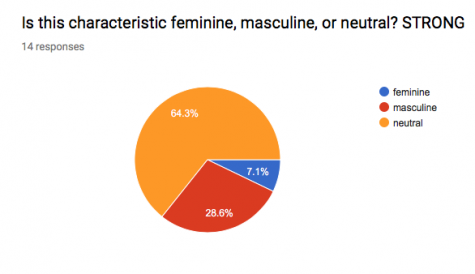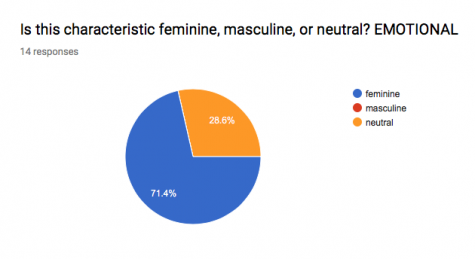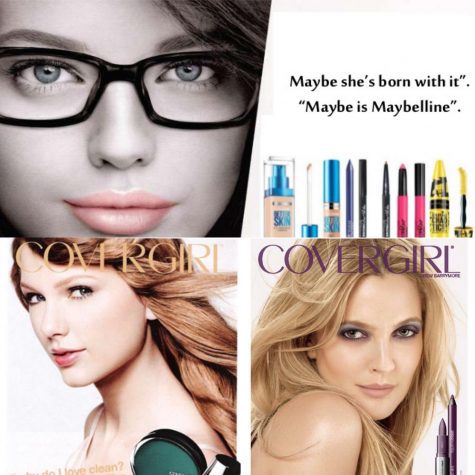Your donation will support the student journalists of North Cobb High School. Your contribution will allow us to purchase equipment and cover our annual website hosting costs.
Gender roles or gender straitjackets?
December 19, 2018
Boys wear blue. Girls wear pink. Girls show emotions. Boys do not. Girls must act polite and nurturing. Boys must act tough and aggressive. Girls do this and boys do that.
Parents’ attitudes on gender roles correspond with their children’s perceptions. They tell their sons to “man up” and their daughters to “act ladylike.” The list of the constricting gender roles go on, but not everyone obeys these stereotypes. Even students at North Cobb break these unwritten rules.
Femininity means to live with qualities, traditionally—but not always—associated with women, such as sensitivity and gentleness. Masculinity, mainly associated with men —but not always—means to acquire qualities such as strength and boldness. These definitions tell boys that they cannot show emotions and girls that they cannot act strong.
Four basic gender stereotypes exist: personality traits, domestic behaviors, occupations, and physical appearance. Concerning expected personality differences between genders, people expect girls’ personalities to appear passive, and guys’ aggressive. Because of these personality roles, people insult girls by calling them “bossy” when they do not just sit back.
Domestic behavior roles include the expectation that men bring home the money and women take care of the children, cook, and clean. Occupational roles consist of people assuming women fill nursing and teaching positions, whereas people assume males fill positions—usually higher-up)—such as, pilot or doctors. 72% of the 700 children studied chose a male when asked to identify a surgeon and a female when asked to identify a nurse.
These gender stereotypes strongly influence career choices later in life. Girls grow up believing that these “higher up” positions belong to men. In America, women make up 91% of the nursing population.
“I definitely think that there are a lot of institutions that discourage women from going into higher up positions, such as STEM and medicine. This is discouraging that we still have this problem in 2018. I have hope that as more women enter leadership roles we can allow access to further education, and therefore have more women in STEM and medicine. We just have to hope that it gets better, but we also have to put women in power to do that,” junior Maggie Glacy said.
Physical stereotypes consist of unfair expectations that women must remain thin and men tall and strong. People gape at men wearing makeup, as if cannot put on lipstick. In 2016, CoverGirl announced its first male model for the brand. Still, seeing men in makeup advertisements remains rare. Men strive towards perfect skin and manicures just as much as women.
Almost every single society encourages boys to adventure outside while girls stay home and do chores. Professor at Johns Hopkins University and director of the Global Early Adolescent Study, Robert Blum, found children in his study from extremely conservative and liberal societies that truly believed that women’s personalities associate with vulnerability whereas men’s associate with independence. Since no formal rules exist about gender, men can protect women and parents can encourage men to act brave. The real problem involves balance between the genders. Researchers describe gender roles as “gender straitjackets.”
The media, one of the most dangerous places for gender roles to exist, surrounds adolescents every second of the day. In this digital age, children look up to actors, actresses, artists, and models instead of presidents and historical figures. Boys outnumbers girls 2:1 on T.V. shows and movies that specifically target children.
NC faces a similar problem regarding gender roles. Students struggle with the confinement of gender roles every day with pressure on them from social media, their parents, and their friends. As students break these gender roles, high schoolers slip out of the restraints in different ways.
“I understand that I am a girl that wants to go into a majority male career [engineering], but this does not stop me from pursuing this,” sophomore Hannah Hickey said.
High school girls, constantly surrounded by opportunities to compare themselves to others, feel pressure to wear makeup, nail polish, and cute clothes everyday. Not all girls want to spend time doing makeup in the morning.
“I feel pressure to wear makeup and I feel excluded from the rest of the people that do because I definitely do not. There is pressure from girls that I see at school and from society as a whole,” sophomore Vedika Mathur said.
Girls also feel pressure to not become “too” stocky or sweaty in gym class. A stereotype that women must always look flawless appears in society. They must look fit, but never sweat. Appearance and first impressions count, but these outward images do not define a woman as a person.
“I also feel pressure to not be too bulky, like people say that I do not want to get abs because I am going to look like a man. I am trying to get those abs,” Mathur said.
If a girl wears too much makeup, people insult her by calling her a clown. If a girl chooses to not wear makeup, she looks tired or lazy. It does not matter the achievements of the woman, if her skirt fits too short people cannot trust her.
“I believe that girls can wear as much makeup as they want and as little makeup as they want and nobody should criticize them on their life choices,” Mathur said.
Expectations about how a man should behave also appear in NC. A stereotype stands that men must stay strong and never show emotion. Society characterizes a man who cries as weak. This expectation shows why men commit suicide almost four times more than women. Internalizing emotions works for certain men, but not for everyone. Crying does not indicate weakness—from men or women. Jack Fischl, a journalist for Mic talks about other lessons our boys need to learn that traditionally parents do not teach. These phrases range from, “crying does not make you weak,” to “no means no.” These positive phrases teach boys to live positively and openly instead of shutting emotions inside and putting up a strong front all the time.
“I wish more men were honest and open about how they feel. I feel like it would bring more reality into our lives and we could understand each other better,” sophomore Landon Barrett said.
NC students realize gender roles do not define a person everyday and choose to break these roles by embracing their individuality.
Junior Deandre Mallory participates in theater and describes himself as feminine. He defines his sexual orientation and personality as an open, free spirit and breaks various gender roles by choosing to wear makeup and performing in theater.
“In our community, guys feel as if they cannot be who they are because of judgement from their friends and people around them. But I believe that in this day and age people should be able to be who they are without the anxiety and worry of negativity from others and that’s exactly what I do,” Mallory said.
Sophomore Landon Barrett, also describes himself as feminine. He breaks gender norms by vocalizing his emotions. If something or someone bothers him, he will let his trusted friends know rather than internalizing these distressing emotions.
“Just be yourself honestly. Everyone is going to accept you or not and it doesn’t matter whether you are out or not or straight or not or masculine or not. If people don’t accept you it’s not a big deal,” Barrett said.
Sophomore Brooke Mckinnon, a girl that would characterize herself as masculine, stresses the pressure she feels to act feminine from her family and society. Even at age 15, she acknowledges that the prevalent pressure for girls to become a mother transpired into an expectation. Mckinnon understands that she does not behave like a stereotypical girl, and she goes against the gender norms by not wearing makeup or caring about her appearance.
“Everything you see in everyday life urges girls to wear makeup. You see everyone out with makeup and they will be like ‘Oh wow you finally look like a girl!’” sophomore, Mckinnon said.
Sophomore Karen Graham, a star tennis player, values sports over style. She also chooses to not wear makeup or dress girly. Graham spends her time exercising instead of obsessing over a new hairstyle. She accepts that her everyday appearance does not take much effort, but holds nothing against girls that choose to devote time to grooming themselves.
“I feel like girls are more pressured to dress nice everywhere they go and wear makeup and have their hair done. I wish this was not the case because sometimes we should be able to dress exactly how we want,” sophomore, Graham said.
Gender roles surround adolescents all the time—including students as young as kindergarteners. These restrictions that dictate how students behave can limit them in their successfulness. This world which becomes more deeply influenced by technology and social media everyday contributes to gender roles tremendously. These unwritten “rules” can add stress and mental illness to young students’ lives. Kids grow up with the idea that they must act a certain way because of their gender. Look around. Kids everywhere feel unhappy and constrained because they cannot do what they want to do in their lives.



